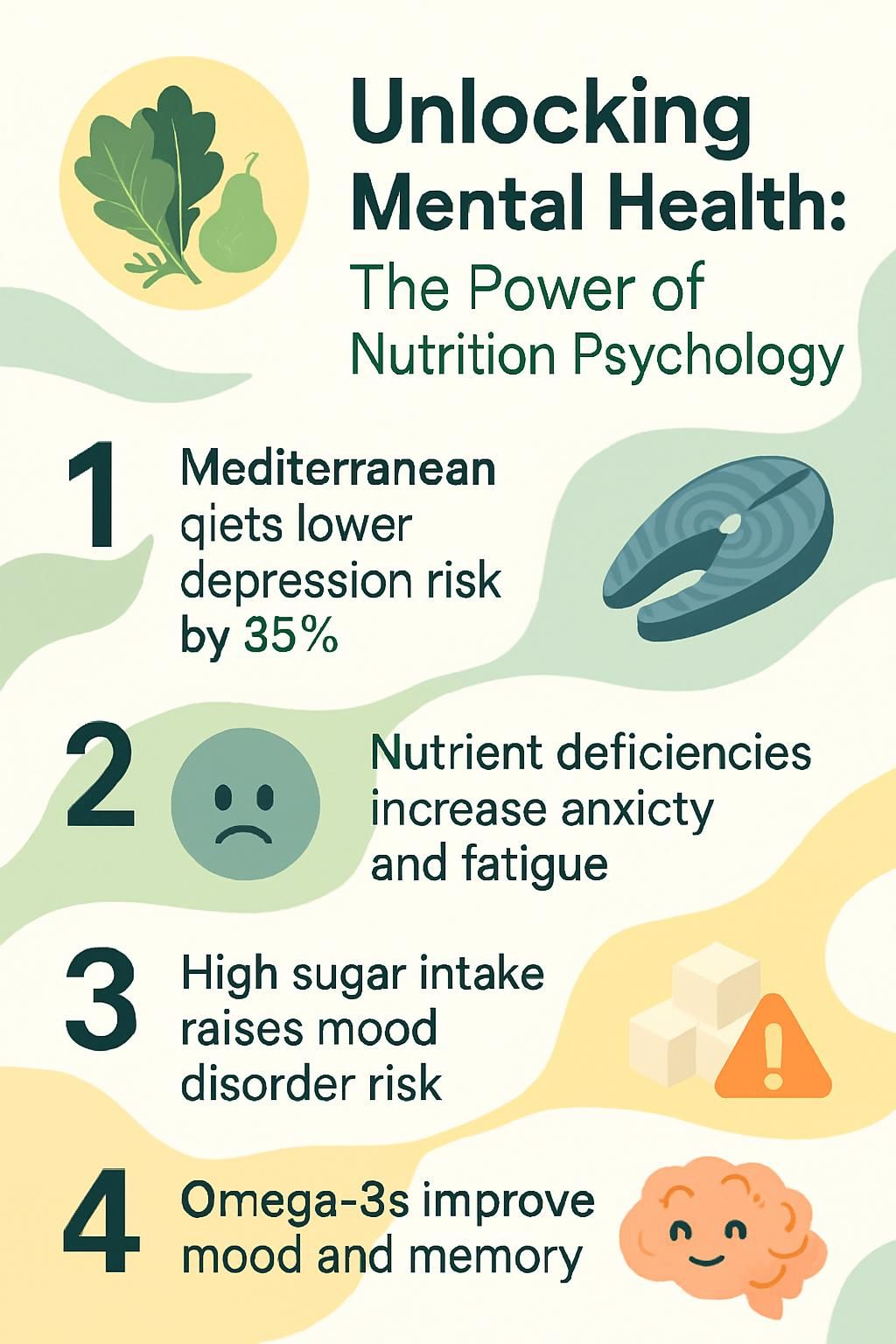Unlocking Mental Health: The Power Of Nutrition Psychology
Our Nutrition Assistant AI Suite will transform your body. You will lose fat, get toned, and build muscle. Gain confidence and optimal health.
If you feel sad, stressed, or tired for no clear reason, your meals may be part of the story. Nutritional psychology looks at how food choices shape mental health, mood, and daily behavior. The right changes can steady energy, sharpen focus, and ease worry.
This guide turns current research into simple steps you can use. You will learn how diet patterns influence your brain and emotions, plus practical ways to build habits that support well-being. This information is educational and is not medical advice. Talk with a qualified clinician if you have symptoms or take medication.
Key Takeaways
- People who follow Mediterranean-style diets have a 25% to 35% lower depression risk than those eating Western diets (Romero-Robles, 2022; Hayek, 2020).
- Low intake of B vitamins and magnesium links with higher depression, anxiety, and fatigue; poor diet quality relates to more psychological distress (Whatnall et al., 2019).
- High sugar and ultra-processed foods raise risk for mood problems, cognitive decline, and emotional eating (Zhang et al., 2024; Schulte et al., 2019).
- Omega-3 fatty acids, polyphenol-rich foods, and probiotics support neurotransmitters and thinking; several vitamins also support mood and memory (Hepsomali et al., 2021).
- Progress improves with team care, including psychologists and dietitians, mindful eating, and simple meal planning that fits your life.

Understanding Nutrition Psychology

Nutritional psychology explores how dietary patterns affect mental health. It blends nutrition science and psychology to study how nutrients shape mood, thinking, stress response, and behavior.
Definition and scope
Nutritional psychology, often called NP, examines how food choices shape emotions, cognition, perception, and resilience. It looks at how nutrients such as omega-3 fatty acids and vitamins support brain function and conditions like major depressive disorder.
The scope covers many topics: disordered eating, malnutrition, overuse of processed food, aggression, sleep issues, attention problems, substance use, trauma responses, and personality traits that guide food intake. Researchers use tools from clinical psychology, neuroscience, and nutritional psychiatry to improve mental well-being across age groups.
Many health psychology professionals apply NP to design interventions that improve overall health through better dietary habits. The goal is simple, help people build steady nutrition patterns that support the mind.
Historical context and development
Mid-20th century clinicians started asking how diet shapes mood and thinking. Training rarely covered both human nutrition and brain health, so care teams struggled to address emotional eating and related behaviors.
The Center for Nutritional Psychology (CNP) pushed for cross-training between nutrition and psychology. It also created the Nutritional Psychology Research Library to organize studies on diet, mood, and behavior. Today, thousands of papers connect diet with mental health across NP and the related field of nutritional psychiatry.
The Science Behind Nutrition and Mental Health
Nutritional psychology examines how diet fuels your brain and shapes your feelings. A balanced pattern supports neurotransmitters, the brain chemicals that carry messages and affect mood, focus, and sleep.
Explanation of how nutrients affect brain function and mood
Your brain runs on nutrients. Vitamins, minerals, and antioxidants protect nerve cells from stress and help regulate mood. Eating plenty of vegetables, fruits, whole grains, fish, dairy, and healthy fats can lower inflammation and support steady energy for thinking.
Gut microbiota, the helpful bacteria in your intestines, matter as well. Most of the body’s serotonin is made in the gut, and healthier microbiota support digestion and mood pathways. Diets high in refined sugar and ultra-processed foods can disrupt these systems and raise the risk for mood disorders.
One practical example, several teens I worked with felt calmer and more focused after swapping sugary snacks for whole-grain wraps, fruit, and yogurt.
Overview of key nutrients (e.g., omega-3 fatty acids, vitamins, minerals)
Specific nutrients play clear roles in brain health and mood:
- Omega-3 fatty acids: support neuron structure and signaling; sources include salmon, sardines, flaxseed, and walnuts.
- B vitamins: help make neurotransmitters that affect energy and mood; found in whole grains, legumes, eggs, and leafy greens.
- Magnesium and zinc: support stress regulation and nerve function; sources include beans, nuts, seeds, and seafood.
- Polyphenols: plant compounds that support cognition; rich in berries, cocoa, tea, and colorful produce.
- Probiotics: live microbes that support gut health and mood; found in yogurt, kefir, and fermented vegetables.
Mediterranean-style eating brings these nutrients together and aligns with better mental health outcomes, including higher quality of life in youth (Romero-Robles, 2022). Diets heavy in refined sugar often relate to more symptoms of mental disorders.
Common Mental Health Issues Linked to Nutrition
The relationship between diet and mental health shows up in daily life. Patterns high in plants and healthy fats tend to support mood and thinking. Patterns high in sugar and processed foods do the opposite.
Depression and anxiety disorders
Higher sugar intake links with more depression in adults in the United States (Zhang et al., 2024). Children with better diet quality report fewer negative emotions than peers with poor diets (McMartin et al., 2013). Traditional eating patterns such as Mediterranean or Japanese diets lower depression risk by roughly 25% to 35% compared with Western diets.
Sugar-sweetened drinks can impair executive function and attention in teens (Zhang et al., 2022; Beecher et al., 2021). Feeling “hangry” is real, as hunger can raise irritability and anger (Swami et al., 2022). More fruits and vegetables relate to less perceived stress across adulthood (Radavelli-Bagatini et al., 2021).
Cognitive decline and memory issues
Diet diversity relates to better thinking in adults, as shown in work by Zhang and colleagues in 2020. Polyphenol-rich foods like berries and nuts support memory and attention (Hepsomali et al., 2021). Lebanese adolescents who followed prudent patterns showed higher academic achievement and social-cognitive skills (Hayek et al., 2020).
Sleep and diet interact. Women with poorer sleep often eat more calories and have lower diet quality, which can harm memory over time (Zuraikat et al., 2020). During exam weeks, I replaced fast food with fish, whole grains, and vegetables, and my recall improved.
Eating disorders and their relationship with nutrition
Eating disorders, including anorexia, bulimia, and binge eating disorder, change how you relate to food. These patterns can lead to malnutrition or overconsumption, which affects both mental and physical health.
Ultra-processed foods can drive addictive-like behaviors and emotional eating (Schulte et al., 2019). High sugar intake can disrupt metabolism and link with substance use problems in some people (Witek et al., 2022). Weak interoception, the sense of internal signals like hunger and fullness, raises the risk for emotional eating and weight gain (Young et al., 2017; Robinson et al., 2021).
During the COVID-19 lockdown, I noticed mood swings after salty snack binges, a pattern observed in France as well (Rolland et al., 2020). Culture, food access, and community settings shape these behaviors, so mental healthcare often blends psychotherapy with nutrition support.
How Nutritional Deficiencies Affect Mental Well-being
Missing key nutrients can shift how you feel and think. This is one reason mental health and nutrition professionals screen for diet quality and deficiencies.
Identifying common deficiencies (e.g., B vitamins, magnesium)
B vitamins and magnesium are common gaps. Low B vitamins relate to depression and anxiety, while low magnesium can lead to nervousness or fatigue. Diets low in whole, nutrient-dense foods often lack these essentials.
Poor diet quality links with more psychological distress and less resilience (Whatnall et al., 2019). Brain fog, mood swings, and low energy can reflect shortfalls on your nutrition facts label. Limited variety or disordered eating can reduce fruit and vegetable intake, which research connects with lower happiness (De Leon et al., 2022).
Impact of these deficiencies on mood and behavior
B vitamins and magnesium help produce serotonin and dopamine, two neurotransmitters that guide mood and motivation. Shortfalls can lead to sadness, irritability, apathy, or low drive.
People with chronic pain often change their eating patterns, which can worsen mood (Lin et al., 2022). Highly processed foods usually lack vital nutrients and can make these issues worse. Teens who drink sugar-sweetened beverages more often report insomnia and distress (Kleppang et al., 2021). Older adults with monotonous diets may show lower resilience to stress (Yin et al., 2019). When I swapped fast food for leafy greens and whole grains in college, my focus and mood lifted within weeks.
Food as Medicine: Dietary Strategies for Mental Health
Simple diet shifts can support mental health. Start small, stay consistent, and notice how your body and mood respond.
Foods that boost mood and cognitive function
Several foods stand out for the brain:
- Colorful produce and cocoa for polyphenols that aid memory and attention (Hepsomali et al., 2021).
- Leafy greens and carrots that track with higher happiness in trials published in JAND in 2022.
- Fatty fish, nuts, and seeds for omega-3 fatty acids that support brain cell structure.
- Fermented foods like yogurt and kefir for probiotics that support gut-brain signaling.
Traditional diets rich in these foods relate to lower depression risk and better quality of life in youth (Romero-Robles, 2022; Hayek, 2020). Balanced meals can also reduce daytime sleepiness and improve focus at work.
Importance of a balanced diet and meal planning
A balanced diet gives your brain steady fuel and protects it from oxidative stress. Vegetables, fruits, whole grains, legumes, fish, and fermented foods deliver key vitamins, minerals, and antioxidants. The Mediterranean diet is a useful template for many people.
Meal planning helps you avoid skipped meals and impulsive snacking. It can also make workday eating healthier, which improves mood and nutrient intake. Plan to limit refined sugars and ultra-processed foods, since they can disrupt mood. Gut bacteria thrive on fiber-rich plants, which helps nutrient absorption and supports a calmer mind.
Role of gut health in mental well-being
Your gut and brain talk through the gut-brain axis, a two-way communication network. Most of your serotonin is made in the gut, which means digestive health can shape mood, appetite, and pain signals.
Healthy gut bacteria support a stronger intestinal lining and lower inflammation. Fermented foods and fiber help good bacteria grow. Research also shows that how you think about sugar can affect glucose metabolism, a sign that the mind and body are tightly linked (Park et al., 2020).
Mindful Eating and Its Benefits for Mental Health
Mindful eating gives your attention back to your plate, your senses, and your body’s cues.
Introduction to mindful eating practices
Mindful eating means noticing the look, smell, taste, and texture of food. You slow down and check for hunger and fullness signals. Sensory cues like color and aroma can steer food choices (Spence et al., 2016; Proserpio et al., 2019). Colorful produce often nudges healthier picks.
Feelings after eating vary by person and culture, as Duerlund et al. (2020) showed. A short food and mood log can reveal patterns. After I tracked meals for two weeks, I saw that heavy lunches made me sluggish, while lighter options kept my focus steady.
How mindfulness can reduce anxiety and improve food choices
Mindfulness builds interoception, the awareness of internal signals like fullness and tension. Better interoception relates to healthier food choices and lower body weight (Robinson et al., 2021). Focusing on your meal, without screens, can improve portion control and reduce stress eating.
Disrupted interoception links with emotional eating (Young et al., 2017). Emotions shape food behavior, so self-awareness helps you pause before cravings take over (Devonport et al., 2019). After I switched from distracted snacking to quiet meal breaks, I felt calmer about food choices and had steadier energy.
The Role of Supplements in Nutrition Psychology
Supplements can help fill gaps in a diet, especially when lab tests or symptoms suggest shortfalls.
Overview of popular supplements for mental health (e.g., omega-3s, probiotics)
Common options include omega-3 fatty acids from fish oil or algae, probiotics for gut health, and targeted vitamins and minerals like B vitamins or magnesium. Research discussed by the American Psychological Association links omega-3s with improved mood and thinking in some people. Polyphenol-rich products may support memory and attention in select cases (Hepsomali et al., 2021).
During a heavy exam period, I tried omega-3 capsules and noticed better focus. Supplements can support care but do not replace standard treatments for mental disorders.
Guidance on safe and effective usage
Start with a nutrition review and, if possible, lab tests. Work with a registered dietitian or healthcare provider, since some supplements interact with medicines. Choose third-party tested brands to reduce quality risks.
Use supplements to address confirmed needs, not trends. Food comes first; supplements fill specific gaps. Track your mood, sleep, and energy for several weeks and report changes to your clinician. A small vitamin D dose helped my winter energy after a low test result, which showed the value of professional guidance.
Creating a Personalized Nutrition Plan for Mental Health
Your goal is a plan that fits your life. Keep what works, drop what does not, and build from there.
Steps to assess individual needs and preferences
Track your meals, snacks, and drinks for one to two weeks. Add notes on mood, energy, sleep, and focus. Look for patterns, such as a sugar crash after lunch or calmer evenings after a balanced dinner.
Discuss possible deficiencies with your clinician. Common gaps include B vitamins, vitamin D, and magnesium. A brief elimination period can help you test triggers. Reintroduce foods one at a time and watch for changes in mood or thinking. When I cut refined sugar for three weeks, my focus and patience improved.
Collaborating with healthcare professionals for tailored approaches
Partner with registered dietitians, psychologists, and physicians. Clinicians trained in nutritional psychology often combine therapy skills with diet counseling. Dietitians who focus on mental health design plans that support cognition and emotional balance.
Health coaches can help with routines and accountability. Behavioral health nutritionists support people with emotional eating and eating disorders. Researchers and public health teams also shape programs using evidence from the Nutritional Psychology Research Library. Working together improves safety, effectiveness, and personalization.
Conclusion
Nutritional psychology shows a clear link between nutrition and mental health. Small, steady changes to diet can support mood, clarity, and daily functioning.
Recap of the importance of nutrition in mental health
Food choices influence mood, cognition, and behavior. Diets rich in leafy greens, fatty fish, legumes, and whole grains support brain function and emotional balance. Low-quality diets raise the risk of depression and anxiety.
Key nutrients such as omega-3 fatty acids, B vitamins, and magnesium help build neurotransmitters and protect the brain. Evidence from trusted sources, including CNP and peer-reviewed journals, supports nutrition as a meaningful part of mental health care.
Encouragement to explore dietary changes for improved psychological well-being.
Consider a few simple steps this week. Add a serving of vegetables at lunch, swap one sugary drink for water or tea, and include a source of omega-3 fatty acids twice. Track how you feel.
From my experience, more whole foods and less sugar brought steadier energy and a clearer mind. You may notice the same. If symptoms persist or feel severe, seek help from a licensed professional. Thoughtful changes to diet can support mental well-being and help you feel more like yourself.
FAQs
1. How does diet affect mood and mental health?
Diet plays a key role in mood and overall health. Research shows that nutrients and dietary choices can impact psychological well-being. For example, studies have found that people who eat more fruits, vegetables, and whole grains often report better moods than those with diets high in processed foods (Jacka et al., 2017).
2. What is nutrition psychology?
Nutrition psychology is the study of how nutritional factors influence mental processes and behavior. This field combines knowledge from both dietetics and psychology to understand the effects of dietary habits on emotional states.
3. Can changing what I eat help treat mental disorders?
Evidence suggests that improving nutrient intake may support treatment for some mental disorders such as depression or anxiety (Sarris et al., 2015). A balanced amount of food rich in vitamins, minerals, and healthy fats supports brain function; however, it should not replace professional care.
4. Why do experts use a holistic approach when studying nutrition’s impact on psychological health?
A holistic methodology considers all aspects of an individual’s life including physical activity, social connections, degree in psychology training among professionals involved, along with diet itself. This broad view helps researchers see how different factors work together to shape overall health.
5. How has understanding about the link between food choices and mind developed over time?
The development of this field has grown through research into the effects of dietary patterns on cognition and emotion as well as greater awareness about the importance of nutrients for brain chemistry (O’Neil et al., 2014). As more data emerges linking specific foods to changes in mood or thinking skills, our understanding continues to expand.
Summary: Nutrition psychology explores how eating habits affect mood by focusing on nutrients’ roles within broader lifestyle contexts using evidence-based methods rooted in both science fields.
References:
– Jacka FN et al., “A randomised controlled trial…” BMC Medicine 2017.
– Sarris J et al., “Nutritional medicine as mainstream…” The Lancet Psychiatry 2015.
– O’Neil A et al., “Relationship between diet quality…” American Journal of Public Health 2014.
Personal Application: After adding more leafy greens and nuts to my meals during college exams based on advice from a professor with a degree in clinical counseling science I noticed improved focus which made me curious about further research into this topic myself.







